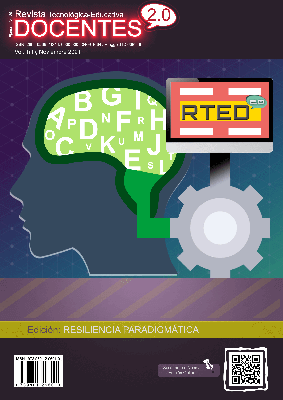Contextualized Approach for the Development of Musical Artistic Research
 DOI:
https://doi.org/10.37843/rted.v1i1.213
DOI:
https://doi.org/10.37843/rted.v1i1.213
Main Article Content
Abstract
In the last 20 years, little has fueled the growth of musical, artistic research. To develop this type of research, the teacher needed to adapt the curricular programming and the curricular plans that have not been contextualized for various academic reasons at the National University of Frontera. This research aimed to propose a contextualized curricular program that develops musical, artistic research in administration, hotel, and tourism students. In this study, four research questions arose: how to identify the development of artistic research? What theoretical foundations should be considered to characterize the program? How to validate it? And what aspects to consider? which gave rise to a proposed non-experimental, propositional quantitative methodology. Three questionnaires were developed; these were applied to 27 students, six hierarchical, two teachers. In this research, three questionnaires of 9 questions were used: the students, hierarchies, and teachers who taught the art course this semester. It concluded that musical, artistic research is not promoted because of the teachers assigned to teach the art course; only 50% are from the specialty. The curricular programs and syllables are not contextualized for the development of musical, artistic research. They have not promoted training projects in the area in question.
Downloads
Metrics
Article Details

This work is licensed under a Creative Commons Attribution-NonCommercial-NoDerivatives 4.0 International License.
Those authors who have publications in our journal accept the following terms:
- When a work is accepted for publication, the author retains rights of reproduction, distribution of his/her article for exploitation in all countries of the world in the format provided by our magazine and any other magnetic medium, optical, and digital.
- Authors will retain their copyright and guarantee the journal the right first to publish their work, which will be simultaneously subject to the Creative Commons Acknowledgment License (Attribution-NonCommercial-NoDerivatives 4.0 International (CC BY-NC-ND 4.0)). That allows third parties to copy and redistribute the material in any medium or format, under the following conditions: Acknowledgment - You must properly acknowledge authorship, provide a link to the license, and indicate if any changes have been made. You may do so in any reasonable way, but not in a way that suggests you have the licensor's endorsement or receive it for your use. NonCommercial - You may not use the material for a commercial purpose. NoDerivatives - If you remix, transform, or build from the material, you cannot broadcast the modified material. There are no additional restrictions - You cannot apply legal terms or technological measures that legally restrict you from doing what the license allows.
- Authors may adopt other non-exclusive license agreements to distribute the published version of the work (e.g., deposit it in an institutional archive or publish it in a monographic volume) provided that the initial publication in this journal is indicated.
- Authors are allowed and recommended to disseminate their work through the Internet (e.g., in institutional telematic archives, repositories, libraries, or their website), producing exciting exchanges and increasing the published work's citations.
- Request of withdrawal an article has to be done in writing by the author to the Editor, becoming effective after a written response from the Editor. For this purpose, the author or authors will send correspondence via e-mail: [email protected].
- The author will not receive financial compensation for the publication of his work.
- All Docentes 2.0 Journal publications are under the Open Journal System (OJS) platform at: https://ojs.docentes20.com/.
References
Ángeles, T. J. (2017). Plan curricular y las competencias investigativas en la maestría de la Unidad de Posgrado en la Facultad de Educación de la UNMSM-2017 [tesis para optar el grado académico de magíster en educación con mención en docencia en el nivel superior]. https://cybertesis.unmsm.edu.pe/bitstream/handle/20.500.12672/11100/Angles_tj.pdf?sequence=1&isAllowed=y
Bocanegra, V.B. (2007). Co-Auto evaluación. Aportes para un modelo de evaluación. Universidad Nacional Pedro Ruíz. Ediciones Odar. EIRL.
Castillo, L.S & Herrera, V.W. (2017). Investigación Educativa. Universidad Pedro Ruíz Gallo.
Cuellar, S.M. (2015). Programación curricular de aula desde el modelo curricular sociocognitivo humanista en una institución educativa de Abancay. Repositorio de la Universidad Católica del Perú. 2017. [tesis para optar el grado de maestría con mención en currículo]. http://tesis.pucp.edu.pe/repositorio/bitstream/handle/20.500.12404/6735/Cuellar_Laupa_Sara_Programacion.pdf?sequence=1&isAllowed=y
Del Sol, F., Tejeda, C. & Mirabal, M. (2017). Los métodos teóricos: una necesidad de conocimiento en la investigación científico-pedagógica. Revista Edumecentro, 9 (4). http://scielo.sld.cu/scielo.php?script=sci_arttext&pid=S2077-28742017000400021
Frega, A.L. (2001). Material visual de la Universidad Autónoma de México. Cuadernos interamericanos en educación musical. 1,1,3 5-47. http://www.revistas.unam.mx/index.php/cem/article/view/7306
Hurtado, J. (2000). Metodología para la Investigación Guía para la comprensión holística de la ciencia. Ediciones Quirón.
Ley Universitaria N° 30220 (2014). Material visual del Ministerio de Educación. http://www.minedu.gob.pe/reforma-universitaria/pdf/ley_universitaria.pdf
López-Cano, R. (2013). La investigación artística musical. Editorial Esmuc.
Mallarino, F. C. (2017). La contextualización del currículo. Cognición y no verbalidad. Revista científica Guillermo de Ockham. 5(1), 73-80. https://www.redalyc.org/pdf/1053/105316864006.pdf
Montero, J.C. (2001). Material visual del Instituto Nacional de Musicología. https://www.lanacion.com.ar/espectaculos/musica/avances-para-las-investigaciones-en-la-musicologia-documental-nid323352/
Otaola González, P. (2015). La investigación en musicología desde una perspectiva pluridisciplinar. DEDiCA. Revista de Educação e Humanidades, 77-95 DOI: https://doi.org/10.30827/dreh.v0i8.6911
Palacios, S. J. (2005). La Universidad y la Investigación Musical: de la Teoría a la Praxis. Revista Interuniversitaria de Formación del profesorado. Universidad de Zaragoza. España. V. (19) 123-156. https://www.redalyc.org/pdf/274/27419108.pdf
Hernández-Sampieri, R., Fernández-Collado, C. & Baptista-Lucio, N. (2014). Metodología de la Investigación. 6ta edición. McGraw-Hill / Interamericana Editores, S.A.
Vegas, C. (1931). Gabinete de Musicología Indígena en el Museo de Historia Natural. https://www.segib.org/wp-content/uploads/memorias_I_coloquio.pdf






